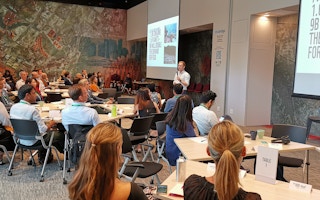Nine companies across the hospitality, tourism and food and beverage (F&B) industries in Singapore have signed a pact to ensure no more new plastic is introduced to the environment, under a new initiative introduced by World Wide Fund for Nature (WWF) Singapore.
To continue reading, subscribe to Eco‑Business.
There's something for everyone. We offer a range of subscription plans.
- Access our stories and receive our Insights Weekly newsletter with the free EB Member plan.
- Unlock unlimited access to our content and archive with EB Circle.
- Publish your content with EB Premium.
Called PACT: a Plastic ACTion commitment, the initiative has committed well-known companies SaladStop!, Udders, PastaMania, Kraftwich, AccorHotels Group, Hilton Singapore, Ramada and Days Hotel by Wyndham Singapore, Pontiac Land and Wildlife Reserves Singapore to a 100 per cent phase-out of all unrecyclable single-use plastic and a transition to reusable or recyclable product and packaging by 2020.
For example, SaladStop! has a plan of going “topless” by providing hot drinks without plastic lids and providing alternative straws made out of paper or stainless steel for cold beverages. The fast food salad company is also aiming to place a charge on plastic bags and provide reusable bags for free at all their outlets.
According to Lotika Mehta, campaigns manager at WWF Singapore, PACT aims to “disrupt the existing linear system of excessive and wasteful consumption,” and replace it with a circular economy that effectively recovers and recycles plastic waste.
More companies are expected to sign PACT this year, following a roundtable held by WWF in December that brought together over 40 companies across the retail, hospitality, F&B and manufacturing sectors.
“What could a synchronised drop mean for Singapore? What could we do to make a real difference?” posed Kim Stengert, chief of strategic communication and external relations at WWF Singapore in his welcome address.
Each person in Singapore uses 13 plastic bags a day on average, a shocking amount that has led to louder calls for plastic waste reduction and stronger policies on single-use plastic.
At the event co-organised by Eco-Business, industry players broke out into working groups to examine the challenges of eliminating single-use plastic within their operations and craft out practical plans to achieve the targets underlined by PACT.
Some of the topics discussed during the roundtable included mechanisms to cut down on single-use plastic, the availability of sustainable alternatives and targets for net positive plastic collection. Across the board, industry players expressed concern over the lack of data on plastic consumption within their operations and information on sustainable alternatives.
The path to plastic-free
Recognising that standards varied within the hospitality sector depending on the type of hotel, Sylvia Low, director of corporate responsibility at Hilton, said: “Creating a single ban or charging mechanism right across the industry might not necessarily be the best thing to do.”
For instance, high-end hotels were less willing to transition to sustainable alternatives such as biodegradable or recyclable plastic due to the difference in the look and feel of the materials.
She said that the hospitality industry needed to get more educated on available solutions and prioritise what actions were feasible for budget, mid-range and high-end hotels.
The roundtable also found that hotels found it difficult to commit to firm targets because of the lack of understanding on how much plastic they each consume. Low added: “Is there a way to audit what’s currently happening?”
Despite concerns, several hotels have reportedly agreed to sign PACT in early January following the December roundtable. A market transformation team is also in the process of writing up a document of sustainable alternatives that would act as a ready resource for companies and improve access to information on plastic reduction.
From the food and beverage industry, companies identified straws as “low-hanging fruit” that were relatively easier to replace, as compared to other items.
On that note, Vardhan Kapoor, business strategy manager at Deliveroo, highlighted the importance of understanding mental nodes and how actions by consumer-facing industries affect consumers themselves.
“There’s this mental switch that consumers have to make in this transition,” he said. “Will they continue on this journey of conscious consumption, or think that one act of reducing plastic straws is enough?”








